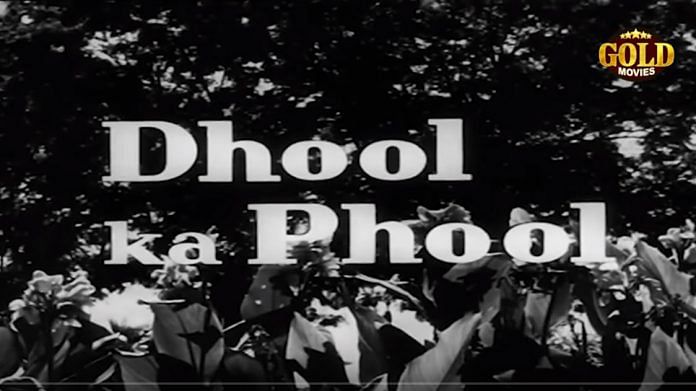When we think of Yash Chopra today, we think of romance. We think of chiffon sari-clad women in alpine settings, we think of gorgeous songs and gorgeous-er people falling in love, staying in love, falling out of love, falling back in love. We forget that Yash Chopra was so much more than that. Right from his first movie, 1959’s Dhool Ka Phool, the man used every Bollywood cliché in the book to tell the most non-clichéd stories.
In a week that saw the seventh anniversary of the legendary filmmaker’s death, ThePrint turns the clock back to Dhool Ka Phool.
What makes a child ‘illegitimate’?
Meena (Mala Sinha) and Mahesh (Rajendra Kumar) are collegemates who fall in love. Well, she does; he seems to be in it only until it’s convenient for him. When Meena tells him she’s pregnant with his child, he vows to marry her. But his father has planned for him to marry Malti (Nanda), the daughter of a rich and ailing businessman, in the hope that Mahesh will not only get a good job but also inherit well. Mahesh does try half-heartedly to argue, but soon enough, acquiesces, without even doing Meena the courtesy of letting her know.
Both Meena and Malti have sons, but the difference in their circumstances could not be more stark. While Malti and Mahesh’s son Ramesh is welcomed with joy and celebration and the entire family in attendance, Meena has been thrown out of her uncle and aunt’s home and soon loses the one person she can call her own, the family’s domestic help. She implores Mahesh to take responsibility for his child, but that, obviously, doesn’t happen. So she abandons the baby in a forest, and subsequently tries to rebuild her life, getting a job as an assistant to an advocate, Ashok (Ashok Kumar). The child is rescued by a man named Abdul, who raises him as Roshan, despite the disapproval of his friends and family: they want nothing to do with either Abdul or Roshan, because they don’t know where he has come from, what his religion is, who his parents are.
This is where Chopra’s vision of pluralism and peace (which we saw decades later in Veer-Zaara as well) makes its first appearance, in that now-iconic song Tu Hindu banega na Musalmaan banega, insaan ki aulaad hai, insaan banega (You’ll be neither a Hindu nor a Muslim, you’re the child of a human being, you’ll be a human being).
Years later, Meena is married to Ashok and Mahesh has become a judge. Roshan and Ramesh become best friends in school, not knowing they share a father, one who openly insults his son’s friend for being ‘illegitimate’, unaware that he is the reason, inconsiderate of the fact that somewhere out there is his own child whom he did not take responsibility for.
Things come to a head when Ramesh dies in an accident and Roshan is accused of theft – Ashok is his defence counsel and Mahesh is the judge. Ultimately, the truth comes out, all the loose ends are tied up and Roshan goes to live with Meena and Ashok.
A bold move, especially in 1959
Is it melodramatic? Yes. Does it require the audience to willingly suspend disbelief? Yes. But strangely, even despite some exceedingly questionable bits (including the language of sin and punishment for the act of sex and the way Roshan is just handed over to Meena as if she didn’t leave him to die in a forest), the film works. It works because Chopra and writer Mukhram Sharma make sure not to glorify Mahesh at any point. He is shown right from the beginning to be a lazy man-child with Raja Beta Syndrome, expecting his father to get him a job and treating Meena like dirt when push comes to shove – and he is punished for it when Ramesh dies. It works because they make sure that our sympathies lie with the children and the women. Meena, for being an unmarried, destitute woman who regrets instantly her abandonment of her baby, and Malti, for telling her husband exactly what she thinks of him – more than once.
At two-and-a-half hours and with eight songs, Dhool Ka Phool seems long by today’s standards. But N. Dutta’s tunes and Sahir Ludhianvi’s lyrics actually take the story forward. For example, Meena’s heartbreak when she goes to visit Mahesh, only to unwittingly find herself part of his wedding procession, is beautifully etched in Daman Mein Daag Laga Baithe.
https://www.youtube.com/watch?v=RTtOlwgiT4Y
And later, when she rocks her baby to sleep, Tu Mere Pyaar Ka Phool Hai captures her bitterness, resentment, confusion and turmoil as a woman who wants the best for her child but knows that the world will taunt, namecall and attack only her, never the man who betrayed her.
So when we think of Yash Chopra today, we’d do well to remember that he was more than the King of Romance. He was someone who took a few risks and told bold stories, right from 1959.




Secularism can’t be Nehruvian. It is the only civilised way of life.